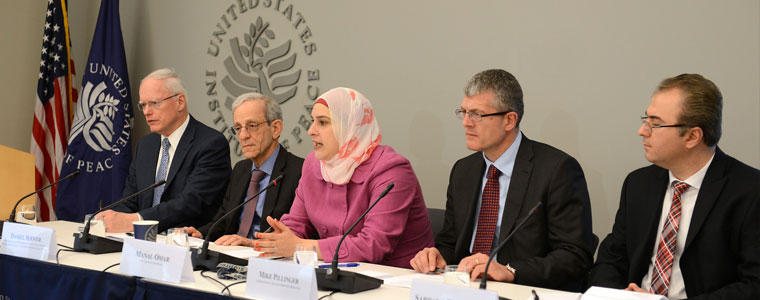Amidst Iraq’s Turmoil: What Can We Do?
How are Iraqis coping with the current crisis, and how can they be better engaged by the international community? What policy levers do the U.S. or other international actors have to help promote stability? What lessons can be applied across the increasingly porous and insecure boundaries of the Middle East?
Read the event coverage, Panel at USIP Urges More U.S. Activism in Iraq, Syria

For well over a year, Iraq’s political, security, economic, and social well-being continues to be shaken by internal and external events that have implications for stability in the country and the region. Despite gains, recent events on the ground have taken a swift turn. Internal displacement, the rise of armed groups, and recourse to violence present serious challenges in maintaining peace and sustained development within the country. As international attention has shifted to Syria and North Africa, the hurdles that Iraq faces internally need to be considered in light of these regional circumstances. Cross-border migration, a large number of returnees, and a growing influx of Syrian refugees too have a destabilizing force in Iraq.
How are Iraqis coping with the current crisis, and how can they be better engaged by the international community? What policy levers do the U.S. or other international actors have to help promote stability? What lessons can be applied across the increasingly porous and insecure boundaries of the Middle East?
Speakers
- Amb. James Jeffrey (ret.), Panelist
Philip Solondz Distinguished Visiting Fellow - The Washington Institute for Near East Policy - Amb. Dan Serwer (ret.), Panelist
Senior Research Professor of Conflict Management - Johns Hopkins School of Advanced International Studies - Mike Pillinger, Panelist
Chief of Mission - Iraq, International Organization for Migration - Sarhang Hamasaeed, Panelist
Program Officer of Iraq and North Africa Programs, U.S. Institute of Peace - Manal Omar, Moderator
Director of Iraq, Iran, and North Africa Programs, U.S. Institute of Peace
This event will be co-sponsored by the International Organization of Migration and the U.S. Institute of Peace.



